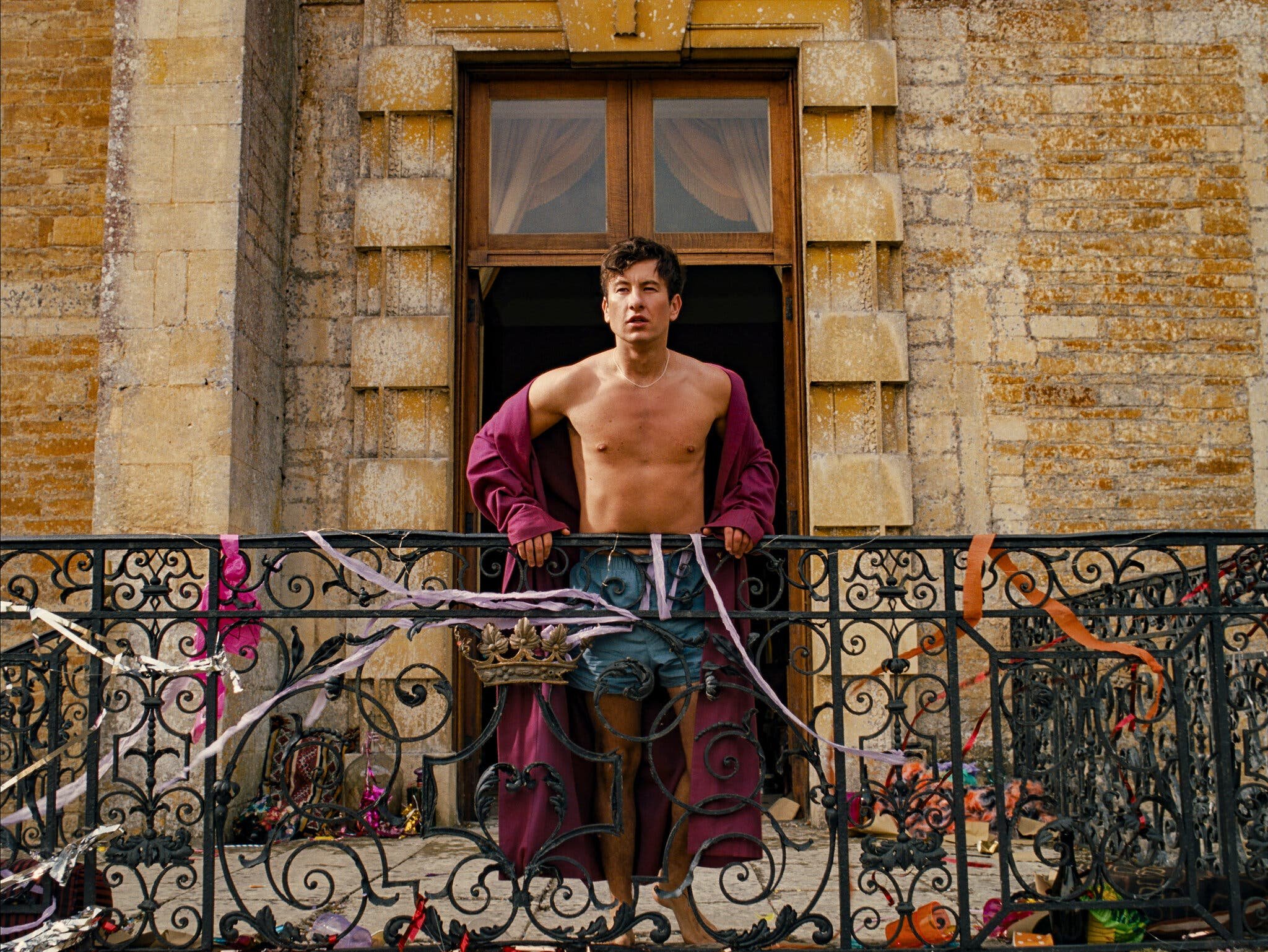Debauched, Ecstatic, and Spiraling
Saltburn came barreling into the last month of 2023 as an homage to gothic storytelling in a modern(ish) setting. Written, directed, and produced by Emerald Fennell for MGM, the movie is a twisting, brooding thriller, perfectly woven together to keep the audience guessing. A blend of homage and satire, Fennell encapsulates the choking peculiarity of life within the British aristocracy.
Barry Keoghan as Oliver in “Saltburn,” directed by Emerald Fennell.
Set in 2006, Saltburn follows Oliver Quick (Barry Keoghan), a scholarship student attending Oxford University. He is an immediate fish out of water with a timid demeanor and awkward dress, earning the ire of Farleigh Start (Archie Madekwe), a well-to-do student. Throughout his first year at Oxford, Oliver notices and grows closer to Felix Catton (Jacob Elordi), a rich student attending his college and cousin to Farleigh. They grow close, and after a tragic life event, Oliver comes to Felix’s home, the titular Saltburn, where he meets Felix’s family, the Cattons, and falls into the hedonistic world they occupy. Fennell leads this film with such precision. The soundtrack is effective, both to elevate scenes and to evoke the early 2000s setting. Her direction fully supports Barry Keoghan and Jacob Elordi. Keoghan makes Oliver impish, his demeanor and stature at odds with the grand air of Saltburn and its inhabitants. Elordi continues to take over 2023 with his naïve, heartfelt approach to Felix. And while Keoghan and Elordi’s characters are firmly the focus of the movie, this is as much an ensemble piece as it is a character study. Alison Oliver gives Venetia Catton a curious air reminiscent of Alice in Wonderland, but she exemplifies Venetia’s wit and emotional intelligence with the best monologue of the film. Madekwe, as Farleigh, is the much-needed logical heart of the film, a true oxymoron, and is as sharp as Venetia but with more pinpoint accuracy. Rosamund Pike and Richard E. Grant play the leaders of the household, Elspeth and Sir James respectively. Pike is the standout, commanding her scenes through a forced nonchalance which betrays a desperate loneliness beneath.
The cinematography is stunning. Led by cinematographer Linus Sandgren, the film lives within shadows and paradoxically tight spaces. It is in a 1:33:1 aspect ratio, providing a narrowing view of the story. The effect lends comparison to the unreliable narrator in literature, since much of our view is “cut out”. Oliver and Felix often follow behind the other in the periphery. This creates the feeling of stalking, of pursuing, of push and pull. Oliver and Felix have this tenuous give and take as the film builds up to the major twists, and so it keeps the audience guessing who will be our villain. Most importantly is Fennell’s obsession with repetition, parallelism, and visual echoes. The film practically rhymes as the story progresses, referring back to compositions, settings, and events, making the film nearly circular, as if all that occurs was destined (and perhaps it was in a way).
Saltburn (2023)
The film is satire, but contrary to some discussions, it is not a satire about class but rather the Gothic genre it hails from. In her own words, Fennell states that the film is a dark comedy, and that “in order to make something uncanny, you have to make it feel familiar first.” The film takes the beats of English literature and film and blows them into absurdity. The timid, “poor” outsider, the rich family, the strange occurrences throughout the story. Visually, the film calls back to classics like Pride and Prejudice (2005), and characters reference Shakespeare, Percy Shelley, Evelyn Waugh. Homoeroticism abounds, with a key conflict being in what way Oliver loves Felix (a question raised in the first minute). Class critique comes as a byproduct of how gothic storytelling defines and portrays poverty. Altogether, Fennell cements the film into this canon of romance, trick of the eye, and debauchery. It is like a modern Jane Eyre from the perspective of Mr. Rochester: a gothic romance turned on its head and revealed for what it truly is.
The only proper criticism of the film is in Act One. The exposition to get Oliver to Saltburn, while necessary, is rushed and clunky. While this lack of stability seems like it should work for the film, it felt more like the rough draft of a first chapter for a finished story. The purpose is to get us familiar with time, place, and character before we delve into the Otherworld of Saltburn, but it fails to deliver on both time and place except for some explicit nods to the decade. It establishes Felix and Oliver well enough, but it places too much emphasis on tertiary characters whom we do not see again for the rest of the runtime. And a warning: heavy themes, drug use, dubious consent, and some sickening scenes abound. This is not a criticism, but something to know before diving in. Besides this, however, the ever-folding plot keeps you leaning in to see what happens next, a maze pulling us to the center. From the revolting to the revealing, this movie is worth the watch.
I leave you with a question. Is he a spider or a moth? Hopefully, this question leads you to find the answer.


